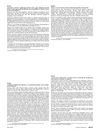39 citations,
April 2019 in “The journal of immunology/The Journal of immunology” Malt1 protease is essential for regulatory T cell function and could be targeted to boost antitumor immunity.
 January 2025 in “Applied Sciences”
January 2025 in “Applied Sciences” Sulforaphane from broccoli may help treat certain cancers, hormone issues, and hair loss.
 January 2023 in “Türkiye klinikleri adli tıp ve adli bilimler dergisi”
January 2023 in “Türkiye klinikleri adli tıp ve adli bilimler dergisi” DNA markers can help predict male pattern baldness, useful in criminal and missing person cases.
 9 citations,
August 2013 in “PLOS ONE”
9 citations,
August 2013 in “PLOS ONE” Genetic variants at 20p11 increase baldness risk in Chinese Han people.
 87 citations,
March 2011 in “Australasian Journal of Dermatology”
87 citations,
March 2011 in “Australasian Journal of Dermatology” Genetics and hormones play a role in male and female hair loss, but more research is needed to fully understand it.
 7 citations,
May 2012 in “British Journal of Dermatology”
7 citations,
May 2012 in “British Journal of Dermatology” Chemical exposure may contribute to the rise in atopic diseases and needs more research.
 21 citations,
December 2013 in “Archives of Dermatological Research”
21 citations,
December 2013 in “Archives of Dermatological Research” No link found between new male baldness genes and female hair loss.
 25 citations,
July 2013 in “Journal of Dermatological Science”
25 citations,
July 2013 in “Journal of Dermatological Science” Six new hair loss factors in men not linked to female hair loss.
 18 citations,
February 2012 in “Experimental Dermatology”
18 citations,
February 2012 in “Experimental Dermatology” No link found between specific genes and female pattern hair loss.
 12 citations,
May 2017 in “Pharmacology & therapeutics”
12 citations,
May 2017 in “Pharmacology & therapeutics” Targeting immune tolerance issues in Alopecia Areata could restore hair growth and maintain remission.
 9 citations,
November 2012 in “Archives of Dermatological Research”
9 citations,
November 2012 in “Archives of Dermatological Research” MC4R gene variants not linked to female hair loss.
 4 citations,
December 2013 in “British Journal of Dermatology”
4 citations,
December 2013 in “British Journal of Dermatology” ESR2 gene linked to female-pattern hair loss.
 2 citations,
August 2019 in “Journal of skin and stem cell”
2 citations,
August 2019 in “Journal of skin and stem cell” The study concludes that regulating apoptosis could lead to new treatments for various skin and hair conditions.
 October 2022 in “Journal for Research in Applied Sciences and Biotechnology”
October 2022 in “Journal for Research in Applied Sciences and Biotechnology” Certain changes in the SHBG gene may increase the risk of PCOS in Iraqi women.
 7 citations,
October 2019 in “Clinical, Cosmetic and Investigational Dermatology”
7 citations,
October 2019 in “Clinical, Cosmetic and Investigational Dermatology” Certain gene variations in the Vitamin D receptor may increase the risk of chronic hair loss.
 90 citations,
May 2019 in “Drugs”
90 citations,
May 2019 in “Drugs” Long-term use of azole antifungals can cause hair loss, hormonal imbalances, and severe skin reactions.

Different genes cause Female Pattern Hair Loss compared to male hair loss, and treatments vary, but more research is needed to understand it fully.
June 2021 in “The American Journal of the Medical Sciences” Androgenetic alopecia is linked to a higher risk of coronary heart disease due to certain genetic factors and high homocysteine levels.
 28 citations,
August 2014 in “Journal of Assisted Reproduction and Genetics”
28 citations,
August 2014 in “Journal of Assisted Reproduction and Genetics” The VEGF +405G allele may increase the risk of PCOS in South Indian women.
12 citations,
January 2018 in “Journal of Clinical Laboratory Analysis” Certain IL-18 gene variations may increase the risk of alopecia areata.
42 citations,
July 2013 in “Gene” IL-4 gene variation may increase the risk of alopecia areata in Turkish people.
12 citations,
July 2015 in “Tissue Antigens” The A allele of the C2 gene increases the risk of lupus, while the G allele may protect against it.
 July 2024 in “Indian Journal of Dermatology Venereology and Leprology”
July 2024 in “Indian Journal of Dermatology Venereology and Leprology” Certain gene variations in PITX2 are linked to a higher risk of male pattern baldness in Indians.
September 2018 in “Fertility and Sterility” The HSD3B1 variant increases hair loss risk in overweight women with PCOS.
 August 2023 in “Sabuncuoglu Serefeddin Health Sciences”
August 2023 in “Sabuncuoglu Serefeddin Health Sciences” CT60 polymorphism might increase the risk of Alopecia Areata.
 February 2013 in “Journal of the American Academy of Dermatology”
February 2013 in “Journal of the American Academy of Dermatology” Certain gene variations might increase the risk of a hair loss condition in Koreans.
 15 citations,
January 2010 in “Reproduction, Fertility and Development”
15 citations,
January 2010 in “Reproduction, Fertility and Development” A certain gene variant may increase the risk of polycystic ovary syndrome in Chinese women.
1 citations,
September 2021 in “Journal of Cosmetic Dermatology” Certain gene variations may increase the risk of hair loss in Egyptians.
 June 2024 in “Current Developments in Nutrition”
June 2024 in “Current Developments in Nutrition” Omega-3 fatty acids may not help and could harm hair loss improvement in middle-aged or elderly men.
6 citations,
March 2020 in “Anais Brasileiros de Dermatologia” CTLA4 gene variants are not linked to alopecia areata in Monterrey's Mexican population.





















